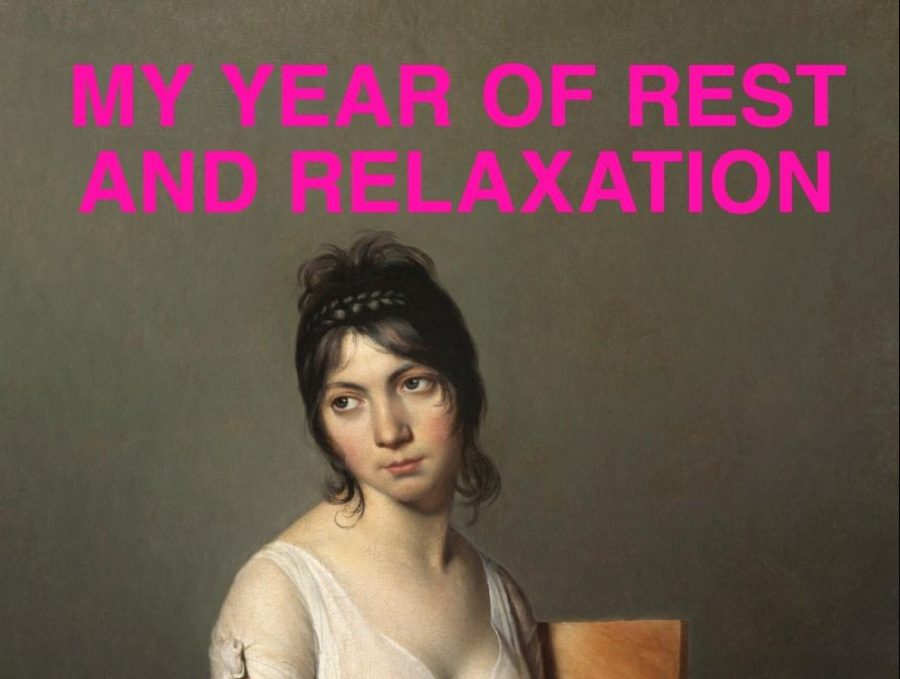The worst satire I have ever read
At least Patrick Bateman was funny
Attempts at satire largely fall flat in “My Year of Rest and Relaxation,” writes Marta Zach.
February 27, 2023
Reading Ottessa Moshfegh’s “My Year of Rest and Relaxation,” I was reminded of Amy Dunne from “Gone Girl” trying to become Patrick Bateman from “American Psycho” — and being unsuccessful in pulling off either persona. I typically enjoy unlikable and irredeemable characters, but only as long as they are intelligent and cunning, unlike the vapid and idiotic narrator who remains nameless.
This is allegedly a satire, but I fail to see how it could be, as any satirical notes are either the narrator excessively criticizing her “best friend” Reva or directly addressing the pseudo-intellectualism of postmodern art. Furthermore, her year of sleeping while on a concoction of pharmaceuticals is just as banal and stupid — if not more so. Satire doesn’t work when it is criticizing empathy and silly human folly — which is exactly what the narrator does as she drones upon Reva — for how can one construct any argument of value when it antagonizes only what is well-intentioned and innocent?
Any time the narrator criticized modern art, she did it so directly and outwardly that it was jarring, and she merely delivered regurgitated takes. It was difficult to deem her credible when she was just as vacuous as the condemned art, expecting something from the world while failing to contribute anything to it. The ending — supposedly intended to comment on the beauty and marvel of life — was entirely far-fetched, and I don’t see how the narrator came to the conclusions she did after a year of rotting in her bedroom. It is ironic because so many descriptions of trite and meaningless modern art pieces are provided, yet this book is the literary equivalent.
Granted, I do think the story has value in providing insight into the removed nature of Western medicine and how it can promote excessive drug use as a band-aid to problems that sometimes aren’t even there or only exist on a small scale. Perhaps the dopey psychiatrist — who prescribes the narrator a sedating series of drugs with a flick of the wrist at the merest demand — is part of the intended satire, which is valid. I do not doubt the need for certain individuals to be medicated — it can often be a matter of sanity or loss of control; functioning or collapse; life or death — but one of the few strengths of this narrative is its ability to shed light on the neglectful abuses that may be prevalent in the industry. However, all of this does little to redeem the rest of the book.
Perhaps I am excessively critical, as I use reading as a form of escapism and have been spoiled by Bret Easton Ellis in the past, but reading about gross main characters whose vulgarity serves as an attempt to be noteworthy is tiring and dreary. I also do not like to read about postmodernist artists in New York who create ridiculous, stupid art — it is a hackneyed take, and perhaps I am narrow-minded, but books about follies in one artistic realm tend to be just as stale as the material they are describing.
I loved “American Psycho,” and I can’t help but see this as a cheap knock-off, even though its premise is different (or intends to be). I noticed long descriptions of material things, a concept that worked magnificently in “American Psycho” but was cringeworthy in “My Year of Rest and Relaxation” — the former well-done and artful, the latter a snide observation of one singular character, Reba, who was neither a valid caricature nor someone deserving of vilification. The narrator represented nothing of substance and neither did anything else depicted in the book — a satire ought to be well-constructed and thought out, and this is not. I still am unsure of what it is meant to be satirizing, and perhaps the author does not know either, instead demanding readers to make sense of something that is inherently scattered and asinine.
It seems that we exist at a place in time where every valid thought and idea has been spoken and claimed already, in light of which I’ve noticed the following phenomenon — a lot of today’s content tries to distinguish itself by virtue of obscenity and strangeness and lewdness. “My Year of Rest and Relaxation” does not do this tastefully, and it ultimately lacks purpose altogether. Between descriptions of someone peeing every ten pages, a fixation on Whoopi Goldberg and her “magenta vagina” (really?) and an irrational idea to be sedated for a year in order to…? There isn’t much of value to this. The ending was hasty and senseless, leaving what could have been a powerful and shocking finale to crash miserably.
I will admit that I read this in one day, but that is because I am not a masochist, and I wanted to get it over with.






















